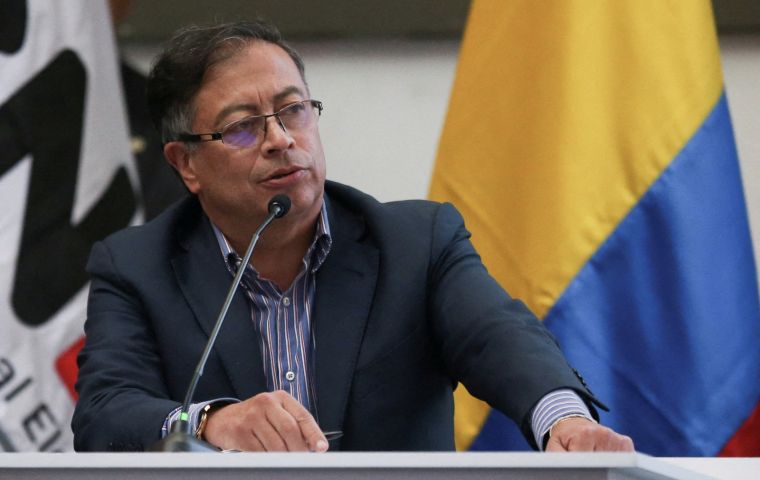MercoPress. South Atlantic News Agency
Daunting challenges for the reformed Colombia Petro pledged
 Colombia is battling with the highest public debt in its history at 65% of GDP, while annual inflation has risen to 9.6%
Colombia is battling with the highest public debt in its history at 65% of GDP, while annual inflation has risen to 9.6% President-elect Gustavo Petro won on the promise to bring deep social, economic and political change in Colombia, but challenges are daunting. Currently the country's GDP is estimated by OECD to grow 6,1% as a result of a post-pandemic consumption boost and international demand for fossil fuels because of the Russian invasion of Ukraine.
But Colombia is battling with the highest public debt in its history at 65% of GDP, while annual inflation has risen to 9.6%. Even worse, only half of the population has formal jobs and only a quarter of eligible adults have access to the pension-s system. With the pandemic, years of stagnation have been followed by increasing poverty.
The tax reforms of the outgoing government resulted in a nationwide protest of weeks, leaving the country in need of new reforms that tackle inequality, poverty and development in rural areas.
Petro wants to raise 50 billion pesos (US$10.7 billion) for public investment and to tackle the fiscal debt. He proposes gradually lowering the corporate tax rate by 5 percentage points to 30% and raising taxes on the 4,000 wealthiest Colombians.
“There are too many taxes on companies and not on individuals, and tackling the issue of personal income tax is essential if we want to make the system more progressive,” said Finance Minister Jose Antonio Ocampo in a recent interview with the Financial Times.
Shockingly, only 5% of the working population pays income tax at all. High rates of informal work and tax evasion have created substantial revenue deficits in Colombia.
But the incoming government wants to go even further: an essential part of the plan is a huge reform of agriculture and land property in a country with a complicated history of landownership and violence..
In effect according to the Geography Institute Agustin Codazzi, 28% of Colombian territory remains unproductive, and the country imports 30% of its food needs, corn, rice, beans and potatoes. The reform intends to tax big landowners who don't use their land to its full potential.
“We were self-sufficient in food. How is it possible that we are now importing beans from China? That is a clear sign of abandonment,” said the incoming minister of agriculture, Cecilia Lopez, in an interview with the Spanish newspaper El Pais. “The farmers were abandoned because our economy focused on developing big industries.”
At the same time, 36% of the Colombian territory is being overused. “Those territories have a substantial risk of degradation. There are forests that should be protected, and the presence of cattle is an environmental offence,” said Juan Antonio Neto Escalante, director of the Geography Institute Agustin Codazzi, earlier this year.
Developing rural regions of Colombia is also essential for peace in the country: a crucial step is to fulfill the first agreement in the peace treaty between the FARC guerrilla and the Colombian government, a comprehensive rural reform.
Petro also intends to start Colombia's transition to green energy. He has promised to ban open-pit mining, cancel fracking pilot projects as well as stopping any further gas and oil explorations.
Coal, oil and cocaine account for half of Colombia's exports, according to the National Administrative Department of Statistics. The increasing demand for coal and oil due to the energy situation in Europe is helping the country's economy. Revenues help stabilize the fiscal debt and contribute to meet its international debt obligations.
Last year, however, the country lost its investment rating and the Colombian peso has sustainedly lost ground against the US dollar. Since his election, Petro has tried to build a broad based coalition in congress by involving some unlikely allies from the Liberal Party and the Party of National Unity, founded by former conservative twice president, Alvaro Uribe Velez.
A legislative majority could support structural reforms, but on the opposite side he will be challenged by rich Colombians, big landowners and companies in the energy sector, a most difficult dispute likely to absorb two years of debate. And meantime he has to keep alive the pledge of a reformed Colombia with full tummies and pockets.




Top Comments
Disclaimer & comment rulesCommenting for this story is now closed.
If you have a Facebook account, become a fan and comment on our Facebook Page!